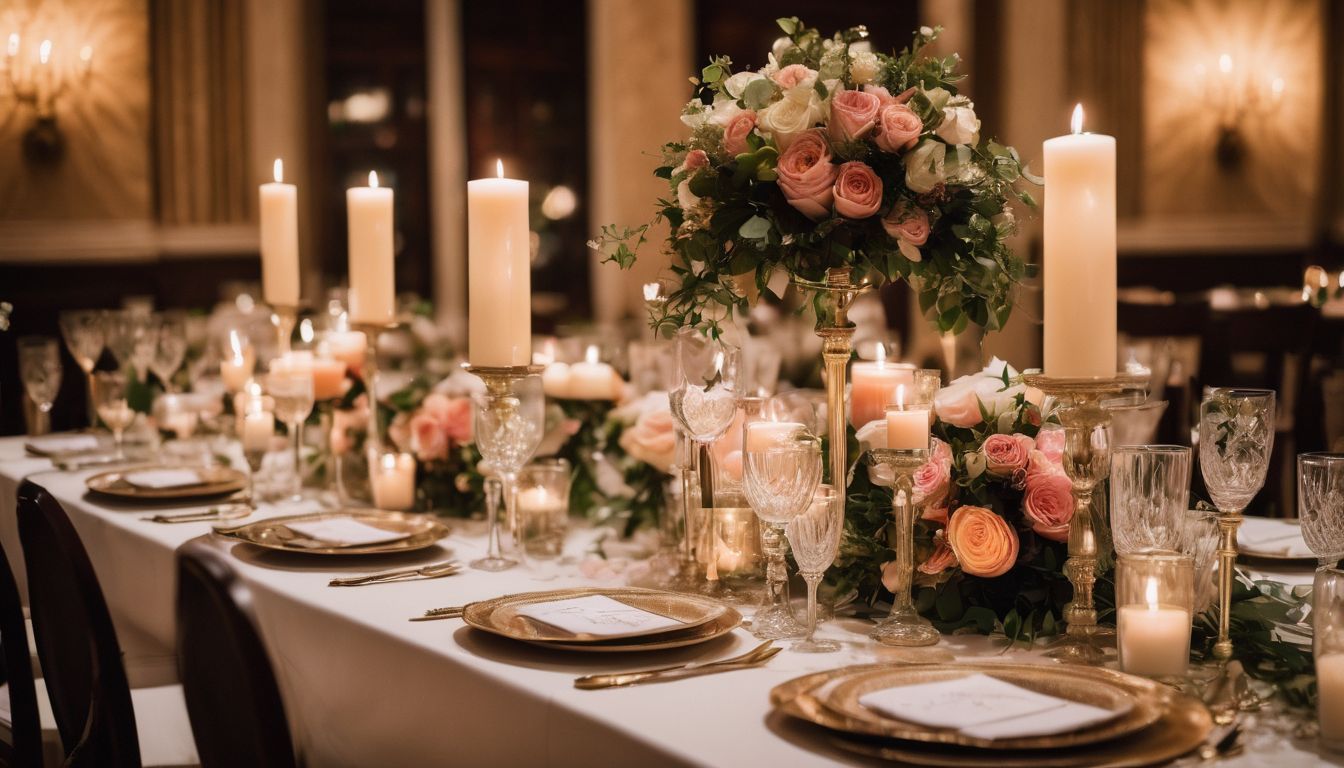Deciding on how long to book a videographer for your wedding can be puzzling. Many couples ponder whether a few hours are enough or if their special day needs all-day coverage. This article will guide you through the ins and outs of wedding videography, helping you gauge just how much filming time fits your dream day perfectly.
Don’t miss out on capturing those once-in-a-lifetime moments – read on for expert advice!
Key Takeaways
- Start filming 1.5 to 2 hours before the ceremony, especially if getting ready at the same place.
- Morning preparations might take longer because of hair and makeup, photos, or delays like missing items.
- An eight – hour package often works well for covering from morning prep to after cake cutting at reception.
- Decide on your video must – haves and consider a second shooter to capture more moments and angles.
- Keep in mind that editing takes around three months; planned end time affects when you see the final video.
Understanding the Importance of Wedding Videography

Wedding videography gives us a moving picture of the big day. It’s like a movie with all the special moments, from the nervous smiles before saying “I do” to the first dance under twinkling lights.
A wedding film lets you hear laughter, see tears of joy and feel the love in a way photos alone can’t capture. Top wedding videographers explain that a video is key for reliving those feelings time and again.
Couples often talk about how fast their wedding went by. With everything going on, it’s easy to miss things. But a good wedding videographer can catch all those bits – your maid of honor’s speech, your grand exit or even just quiet moments between you and your new spouse.
These pros know what makes weddings shine on screen so you can look back at every important part of your celebration for years to come.
How Many Hours Of Videography Do You Need For Your Wedding?

Consider the start of your wedding day, as well as the reasons your wedding morning preparations may take longer than expected. Determine the end time of your event to calculate how many hours of videography you will need for comprehensive coverage.
Consider the start of your wedding day
Your wedding day kicks off with a buzz of excitement. It’s a good plan to have your videographer start filming about 1.5 to 2 hours before the ceremony begins, especially if you’re getting ready at the same location.
This allows them to capture all those special moments – from laughing with your bridal party as you dress up, to the look on your parents’ faces when they see you in your gown or suit for the first time.
Think about whether you want those early morning preparations included in your video. Maybe capturing the ‘first look’, where you and your partner see each other all dressed up before saying “I do,” is a must-have memory.
Filming starts early so no precious moment is missed, whether it’s sharing jokes with friends or those last-minute touch-ups that make everything perfect!
Reasons Your Wedding Morning Preparations May Take Longer
Getting ready on your wedding day can be full of fun and excitement. Yet, sometimes the morning preparations take more time than planned. Here are some reasons why:
- Lots of people are getting dressed. The wedding party might include many bridesmaids, groomsmen, and family members who all need to look their best.
- Hair and makeup artists need time. They take care to make each person look great, which can add extra minutes or even hours.
- Photos before the ceremony. You may want pictures taken while everyone gets ready, and this adds time too.
- Small things can cause delays. Things like lost shoes, a missing tie, or a last-minute ironing can slow down the morning.
- Emotions run high. Sometimes there’s laughter or tears that make people take longer to get ready.
- Travel time must be considered. If you have to go from one place to another, it’s important to add travel time into your plans.
Determining the End Time
Deciding when to stop filming on your wedding day is key. You might want the videographer there until the very end, capturing moments like the last dance and the couple’s exit. Often, an eight-hour package works well as it can cover from getting-ready scenes right up until after cake cutting at the reception.
Think about what events you really want in your video. If you plan a special goodbye or have late-night festivities, consider hiring your videographer for longer to catch those final memories.
Make sure you talk with your wedding photographer too! They often work closely with videographers. This helps them not miss any important shots during the reception or other parts of the day.
Knowing how long they’ll be around can help set a good time for your video to end. Plus, remember that editing takes time—about three months for most pros—so deciding on an end time also affects when you’ll get to see your finished wedding video.
Tips and Tricks for Maximising Your Wedding Day Coverage
Draft your wedding-day timeline to ensure that you make the most of your videographer’s time and capture all the important moments.. Ready to learn how to make sure every special moment is captured on your big day? Keep reading for more valuable tips!
Draft Your Wedding-Day Timeline
Planning your wedding day is fun and exciting. You get to decide how every hour unfolds. Here’s how you can make a great timeline for your big day:
- Start by thinking about the morning. If hair and makeup begin at 12: 00 pm, it’s a good time to start your plan.
- Have the videographer arrive by 1: 30 pm to catch everyone getting ready.
- Make sure hair and makeup finish by 2: 00 pm so there is time for dress up and photos before the ceremony.
- Add in moments like the bride getting dressed and bridal portraits, which are key parts of the day.
- Plan when to take photos with your wedding party. This can be before or after the ceremony.
- A first look is special. If you’re doing one, decide when this intimate moment will happen.
- Remember travel time! Include going from where you get ready to your ceremony place.
- Think about the number of guests you have. This helps plan how long things will take.
- Factor in dinner and speeches at your reception. These usually last between 90 to 180 minutes, especially with lots of guests.
- Aim for capturing fun dancing photos! Consider longer coverage for these evening memories.
Decide on Wedding Coverage Must-Haves
Think about what you really want captured on your wedding day. Your list might include the bride getting ready, the first look, or the speeches at the reception. Talk with your videographer about these key moments.
They will know how to make sure these parts of your day are filmed beautifully.
Don’t forget about adding a second shooter if it’s in your budget. This way, you won’t miss any special moments because one person can’t be everywhere at once. A second shooter can catch different angles and events happening at the same time during your wedding day.
How Many Photos Can a Photographer Take in an Hour?
Understanding the volume of photos a photographer can capture in an hour is crucial for planning wedding day coverage. It typically hinges on the dynamics of the event and the style of the photographer.
Here’s a breakdown in table format for a clearer understanding:
| Photography Style | Average Photos Per Hour | Factors Influencing Photo Count |
|---|---|---|
| Traditional/Posed | 50-100 | Setup time, posed shots take longer |
| Photojournalistic | 150-300 | Continuous shooting, capturing moments as they happen |
| Hybrid (Mix of both) | 100-200 | Combines posed setups with candid coverage |
Photographers adept at traditional styles may produce fewer images, as posed shots require meticulous setup. In contrast, the photojournalistic approach yields more photos through continuous shooting. Many photographers employ a hybrid style, balancing quantity with the need for certain posed images. Hiring a professional for 8 hours might result in receiving 400 to 800 final images, indicating that the number of shots taken per hour can be quite variable. Settings, event pace, and photographer expertise all influence the final tally.
Have a Budget and Stick to It
When planning your wedding, having a budget is crucial. It’s important to allocate funds for each aspect of your wedding day, including videography. Being mindful of your budget and sticking to it can help you avoid overspending and financial stress after the wedding.
With the average couple exceeding their designated budget, having a realistic and workable plan in place can alleviate potential financial strain and allow you to enjoy your special day without worrying about debt.
By prioritising financial planning and establishing a clear budget for every element of your wedding, couples can ensure that they stay within their means while still creating an unforgettable celebration.
Financial planning is key – with 74% of couples ending up spending more than they initially intended, setting a realistic budget early on can prevent future stress.. it’s essential to keep track of expenses throughout the entire process.
Conclusion
In conclusion, the hours of videography you need for your wedding depend on what parts of the day you want to capture. Drafting a timeline and deciding on coverage must-haves can help determine the ideal amount of coverage.
Remember that it’s essential to stick to your budget while ensuring you have enough coverage for your special day. With thoughtful planning, you can maximise your wedding day coverage and preserve precious memories for years to come.
FAQs
1. How long should a wedding video be to capture all the special moments?
To truly capture the essence of your big day—from the intimate ceremony whispers to the laughter-filled reception—a videographer typically records between four to eight hours. This span allows a well-rounded retelling of your story, safeguarding those once-in-a-lifetime flashes of joy.
2. Can I choose how much of my wedding gets filmed?
Absolutely, it’s your narrative to tell! Discuss with your videographer beforehand—decide on key events like exchanging vows or catching bouquets you’d love immortalised. Customising ensures every cherished chapter is captured without missing a beat.
3. What does data protection mean for my wedding video footage?
Rest assured, with data protection in place, your memories are secure. The videographer will handle your personal moments with care, ensuring they’re stored safely and shared only according to your wishes—privacy and peace of mind go hand in hand here.
4. Is there such thing as too much footage from my wedding day?
While more footage means more memories, consider quality over quantity; an expertly edited highlight reel often holds more value than hours upon hours of raw film—it’s about capturing the spirit and magic efficiently so that each time you watch it feels just like being there again.






